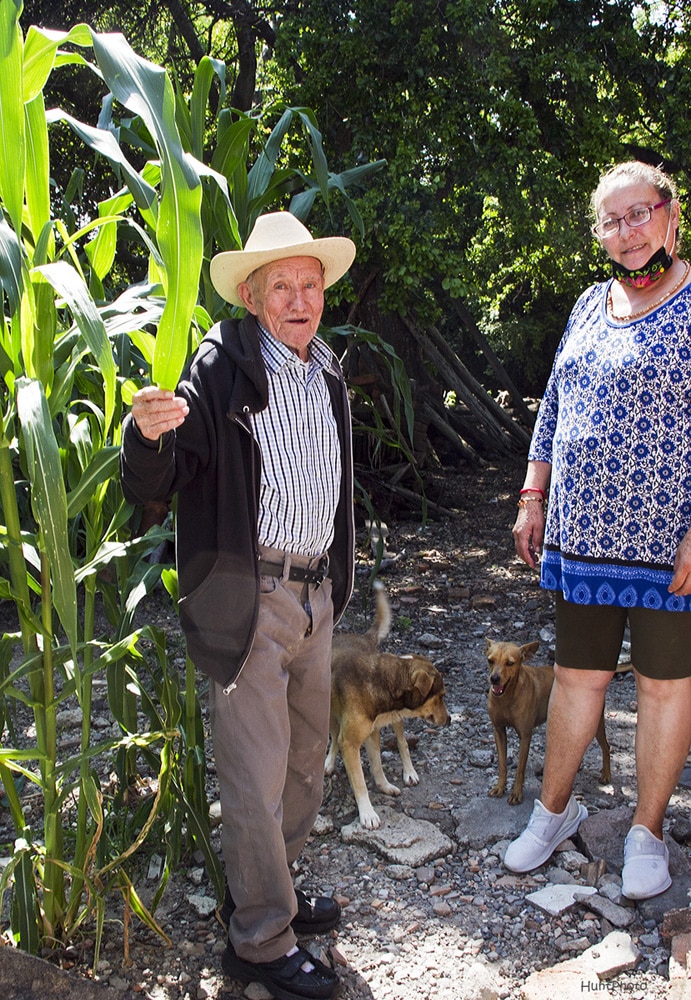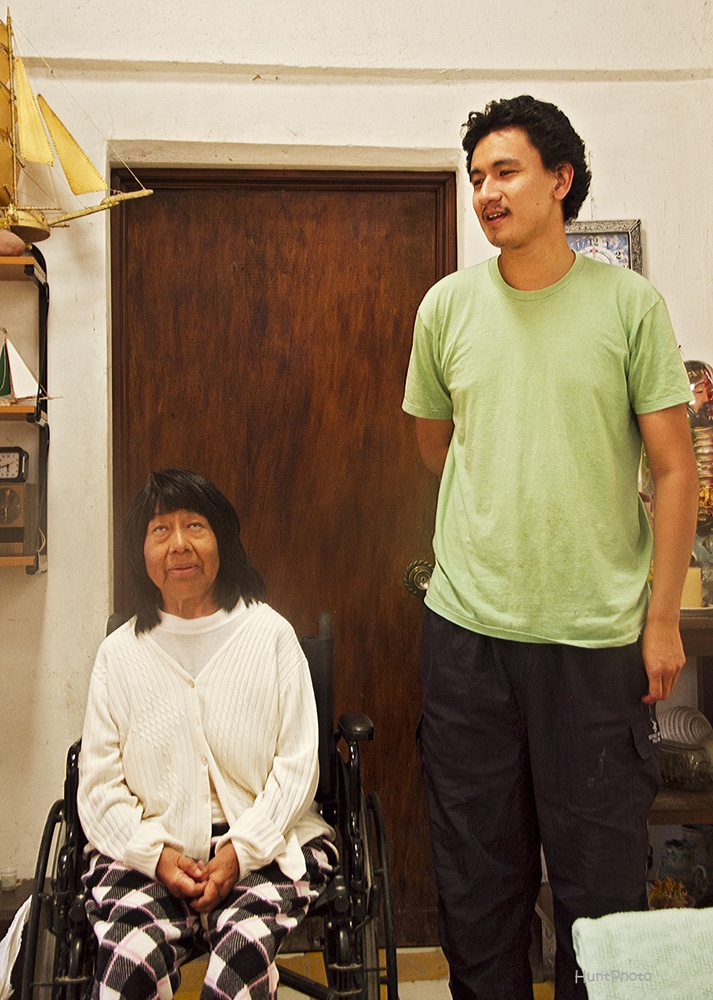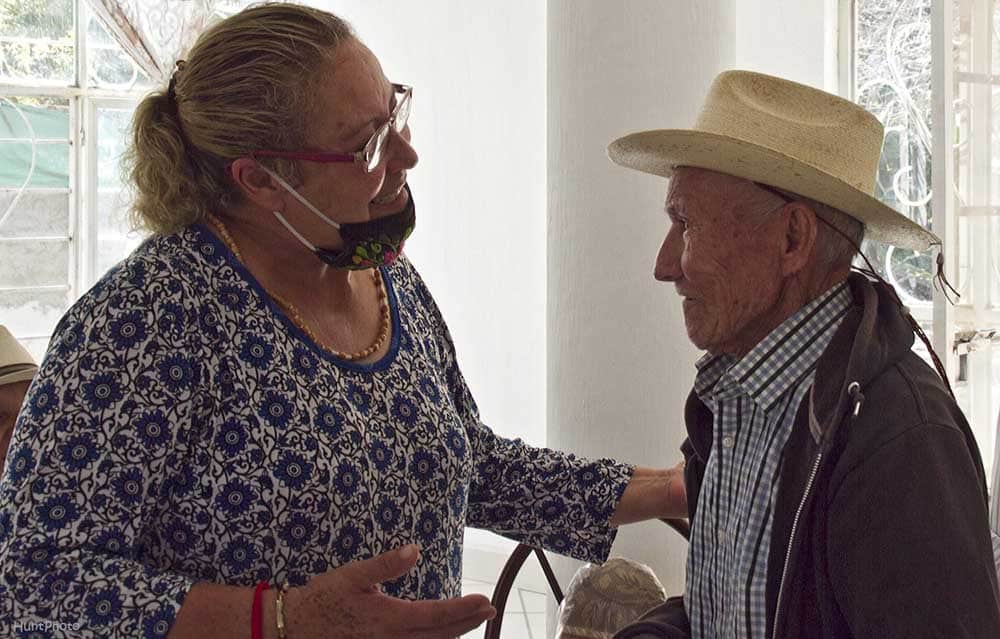Gloria and Domingo
Today we visited two special residents in Santa Cruz, a small village near Chapala. During the deliveries of our despensas we met Domingo and Gloria. Gloria is Domingo’s caretaker, she has known him since she was young and when Domingo couldn’t live alone anymore Gloria stepped up to be his caretaker. She doesn’t make any money doing this, she does it out of the goodness of her heart.

Domingo, 87 has been getting forgetful for some time now but he always took walks to the tienda until one day last year when he did not return. Word spread very quickly in Santa Cruz about Domingo disappearing and everyone came out of their homes to find him. They searched for hours but could not find him. They searched for Domingo for seven days and nights until they found him in the hills about five miles away in the hills above St. Nicholas.
Domingo had somehow survived the entire time even though he was lost and scared. The searchers found him laying on his back, disoriented and very confused. Gloria now gives him 24/7 care since that day. Neither of them have a steady income and they survive on the sales of Gloria’s crocheted bedspreads. The bedspreads are quite intricate and beautiful but they take her a lot of time to make.
The despensas have been such a blessing for them. Domingo was always a farmer and he and Gloria planted a small corn crop in their garden but it wasn’t enough to sell, just enough for them. Now they look forward to their despensas which are delivered every other week. They receive the staples necessary to keep them going.
Both Gloria and Domingo were proud to invite us into their home so we could see how much the despensas mean to them. They want all of our donors to know just how much they appreciate these bi-weekly deliveries and they send their prayers and thanks to everyone involved in FoodBank Lakeside.
Esther Pulido Vasquez
Esther is 80 years old and lives alone in the village of Santa Cruz. She is a recipient of our bi-weekly despensas. Esther is blind and she counts on the people in Santa Cruz to help her out.

We were invited into her backyard to visit with her during the delivery of her despensa. We were very honored that Esther invited us into her home to talk with her. We joined her in the backyard on the patio with her two caretakers Maria Elena and Maria Dolores. Maria Elena and Maria Dolores are cousins and both help Esther in different ways.
There is not a social system in place to care for elderly or disabled people who usually depend on family to care for them. Esther unfortunately never married and took care of her parents until they passed leaving her alone. She had three sisters but has outlived them as well. Again, this lovely village of Santa Cruz provided two angels to help care for Esther. Maria Dolores provides some financial help and Maria Elena makes sure she has meals to eat. They both take time to visit her and to make sure she has everything she needs to be comfortable.
Esther loves to reminisce about growing up in Mexico. Her happiest memories are when she was young and she would meet with her friends and they would sing songs about love. The boys from the village would bring her flowers but her papa would always chase them away. She smiles and laughs as she remembers these happy times. We were also reminded of her joy as she sang to us with the most beautiful smile on her face.
The despensa means the world to this lovely woman. She receives her despensa bi-weekly and always has a smile on her face. She loves to have visitors, next time I visit I will definitely be bringing her some flowers.
Paula and Rubben

A mother and her devoted son, that is Paula and Rubben. Today we visited a mother and son duo in Santa Cruz. Paula has been in a wheelchair for years and her caretaker is her 24 year old son Ruben.
Rubben still has a dream to attend college in Guadalajara. As an outsider looking in on the dynamic duo I felt the hope that Rubben has for his future. He really needs our help above and beyond the despensas that he and his mother receive.
I know that Rubben has a great responsibility to help his mother but I would really hate to see him lose his dream of attending college. I think Rubben really needs a mentor that could help to guide him and help him realize his dream. He told us that he hasn’t been able to get his name on the list of those who are eligible for the university which is why he could benefit from someone to help him through the process.
Update – Son Now Attending College and Mom Still Gets By…
A lot has changed since Paula Zuñiga and her son Rubben were featured in a FoodBank Lakeside website story “Families We Serve in Santa Cruz”. At the same time, much remains the same.
Rubben
Rubben, 27, always offers a ready smile enveloped by shyness as he greets visitors and easily provides an update on how his life has changed so much recently.
Rubben was living at home, attending to his mother and hoping someday soon to be accepted at the Universidad de Guadalajara, widely regarded as one of Mexico’s most prestigious universities. He had added his name to the list of those eligible to attend the school but remained on the school’s waiting list.
His dream came true last summer. He was accepted as an undergraduate for the Fall 2022 semester As of this spring, Rubben is a full-time student completing his first year of study. His classes have included world history, introduction to sociology and learning how to properly conduct research for class papers and tests. So far, he is averaging about 87 percent in his studies.
His major is Sociology. He plans to get a four-year degree and then pursue a master’s degree in the same subject. After that, he isn’t certain yet what he will do. “There are a lot of fields where I can work, but I have not figured that out yet,” Rubben said.
When classes are in session Rubben rents “a little room” near campus. His uncle covers the cost of his living space and utilities. Other expenses, including class supplies, food and bus rides, must be covered by the $1,500 – $2,000 MXN Rubben must live on monthly. He is waiting for his student ID so he can ride public buses for free instead of paying $100 – $200 MXN for transportation, as he does now.
Weekends at Home
Every weekend and when classes aren’t held, Rubben returns to Santa Cruz and his mother. He rides the bus to Chapala and then rides a smaller bus to Santa Cruz de la Soledad, a neighborhood on Chapala’s northeast edge. That bus deposits him along the Chapala-Mezcala road or, at times, at Santa Cruz’s plaza. Rubben then walks home.
Paula
Paula (pronounced Pa-oo-la) is a Santa Cruz native. She inherited her home after her parents passed away. She needs her wheelchair to get around her house and yard.
She now takes care of herself with help from others. She rents two rooms in her home and a cousin provides $1,000 MXN, plus pays helpers to clean Paula’s house. But despite this financial aid, FoodBank Lakeside’s despensa is essential to her.
Paula, 50, said in Spanish that she has received monthly FoodBank Lakeside despensas for about two years. She depends on a monthly despensa of basic food, delivered by FoodBank Lakeside volunteers, to feed herself and make ends meet. Because she now lives alone except when Rubben comes home, the donated food can last her about three weeks.
Many, Many Thank You’s
“Thank you – many, many thank you’s – because it helps a lot,” Paula said. “Thank God for the goodness of their (donors’) hearts, their charity and doing what they do.”
The stories shared by Rubben and Paula highlight how the food assistance provided by FoodBank Lakeside can have a profound impact on the lives of families in need. Not only does it provide a reliable source of nutrition, but it also can help keep families together by alleviating financial stress. Rubben’s journey towards self-sufficiency is a prime example of how the generosity of donors to FBL can make a real difference in people’s lives. With continued support, more families can benefit from the services provided by FoodBank Lakeside. If you’d like to donate and make a difference, please visit www.foodbanklakeside.org/donate.
Update written by Steve Taylor, FoodBank Volunteer
Interpreter Brenda Vazquez contributed to this article.

